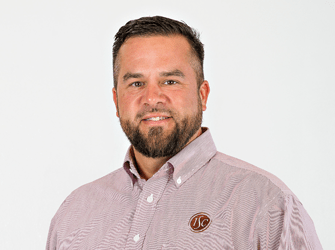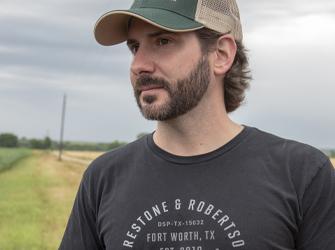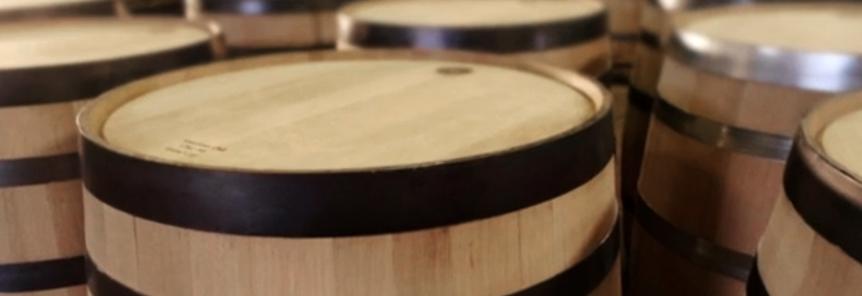An Interview with Rob Arnold of TX Whiskey
ISC Barrels Account Manager Chad Spalding recently (virtually) caught up with the Master Distiller at TX Whiskey, Rob Arnold. Listen to their discussion of how Rob uses our ISC Barrels to craft TX Whiskey.


Chad: Welcome everyone, Chad Spalding here with Rob Arnold, the Master Distiller at TX Whiskey down in Fort Worth, Texas. Rob, I appreciate your time stopping in with us today.
Rob: Yeah, thanks for having me.
Chad: So, you know [this is] a little awkward - most of these [interviews] are in person for me, but with the way times are right now, during this period in our world and in our lives, we are going to have to do it via Zoom broadcast. A little bit different but still one-on-one, you and I, we will just talk through it.
Rob: Yeah, we are all used to Zoom now so it’s good.
Chad: Yeah, it’s kind of the new normal almost.
Rob: Exactly.
Chad: First of all Rob, the first question we like to ask is how did you get started in the spirits industry?
Rob: Well, our distillery is in Texas, we make Texas whiskey, Texas bourbon. But I’m from Kentucky actually so I didn’t grow up in Texas, I grew up in Louisville, Kentucky. I am a third-generation member of the industry, so my uncle, and my grandfather, and my great-uncles were all in the bourbon industry in Kentucky. Most of them were with Brown-Forman. I knew about the industry growing up but it was just kind of a normal thing. I didn’t really grow up with this idea that I was going to go into the whiskey business, but I definitely knew about it. I actually started off going to college and grad-school really pursuing medical research. I did an Undergraduate Degree in Microbiology. I then went to get my PHD in Biochemistry here in Texas at the UT Medical Center in Dallas. During that graduate school period, I started making beer at home, started home brewing, and then maybe I also made some whiskey at home, I don’t know, you make your assumption on that one. Through getting into the hobby of home brewing, I realized the overlap of how the science that I was already passionate about could mingle with this really cool, creative, artistic craft. Then that combined with learning more about my family and their background in the bourbon industry in Kentucky, kind of like all the stars aligned I guess as far as me deciding to pivot away from medical research towards the whiskey industry. But then I had to find a job in the whiskey industry and through the grapevine, while I was still in grad school, I was introduced to the two original proprietors of TX Whiskey Troy Robertson and Leonard Firestone and we started talking over the course of a few different meetings and had very similar ideas for what TX Whiskey, TX Bourbon Whiskey could be and how we would approach it. So I left, dropped out of my PHD program, so I’m a grad school dropout, to join TX Whiskey. This was back in 2011 so I was the first employee, joined about 9 years ago now almost to the month.
Chad: Wow, that’s a roundabout way of getting into the business I guess huh.
Rob: Yeah, people always think it was just predestined given that I do have a lot of family ties to it but no it didn’t go down that way. It was definitely a roundabout approach.
Chad: So, you know Independent Stave Company, you guys have been with us, partners with us since the very beginning.
Rob: Yup.
Chad: I remember actually meeting Troy and Leonard when they come to Kentucky, when they were dreaming this idea up. I think I may have given them a tour of our cooperage.
Rob: Yeah, there are still pictures of when they visited and went to the cooperage. That was a few months before my conversations with them. Day one Independent Stave Company has been our cooper, our barrel supplier.
Chad: Alright, with that being said - do you have a go to ISC Barrel at the moment? I know we have been doing a lot of experimentation recently and you may have a new one versus what you used to use.
Rob: We started off with the Classic whiskey barrel - Char 3 Plus is what we’ve always requested, so right in the middle of 3 and 4. We didn’t used to specify seasoning of the wood and things like that but over the years we started working on trials with you guys, looking at the Cooper’s Select 18 month seasoned, the Cooper’s Reserve 24 month air seasoned wood, and then different toast and char profiles and we were able to develop a couple of proprietary toast recipes with you guys through a multi-year experiment. So now we mingle in a variety of barrels. Basically the way our barrel program works is every single style of our straight whiskey, whether is it our straight bourbon whiskey or straight rye whiskey, gets put into three different barrel types; they are all Cooper’s Select, so they are all 18 month air seasoned wood, and then one of those barrel types would be a Char 3 Plus and then the other two are toasted prior to a Char 1 and they are different toast recipes. Now I don’t know if I have a favorite among those three, but you know especially those two proprietary toasts that we did finally land on, you know there were four, five, six that we looked at originally and kind of narrowed it down to those two, so big fan though in the air seasoned wood. It’s a very noticeable difference from early on and really had a lot of fun exploring what I guess you could call them somewhat unique to the industry, at least historically...
Chad: Oh sure.
Rob: …it is toasted lightly charred barrels. You know the favors we get are distinct and unique but really nice.
Chad: Yeah, that’s one of the barrels that you guys were in early on and in experimentation of these types of barrels and people are starting to catch on, they are not just doing the Char 3, Char 4 barrels anymore. You know, is one better than the other? Maybe, maybe not, depends on who you ask - but they are different for sure.
Rob: The word better in this industry, I don’t like to use it. Different, different is a good word and that’s the whole goal with having three barrel types in our policy and our program for every style. It’s not that we think that one is better than the other, it’s not that we are trying to you know narrow it down to two or just one eventually, it’s that we want some diversity in each one of our styles delivered from the barrel because they are different.
Chad: And to have that to blend at the end of the run.
Rob: Yeah, yeah and that’s why we are lucky we have a really talented blender, Ale Ochoa, at TX Whiskey who has a Master’s Degree in Food Chemistry and Sensory Science and a very talented blender. I get to introduce all the flavor diversity and variety and she has to figure out how to handle all of that and make sure we have consistent and high quality products.
Chad: Got ya! Alright moving right on. Do you have a favorite cocktail or do you drink your TX whiskey or bourbon neat, on the rocks? What’s your go to drink there?
Rob: Um, usually with whiskey I’m going to drink it neat or with some water or ice, I mean Texas is hot man. I don’t care what a connoisseur or enthusiast might say, it’s 105 degrees in Texas a lot of times - a room temperature bourbon just isn’t that appealing. I don’t have any problem with ice. I don’t like to down it with ice but you know chill it and let the dilution kind of open up some flavors. I do like old fashions, you know we have a great pecan old fashion, that our mixologist here at TX, Jason Shelly, puts together that’s delicious and dangerously smooth for what it packs. My wife is much more into cocktails than I am so whatever she kind of mixes up on any given night, I’ll probably try that.
Chad: All right, so we talked a little bit about different types of barrels, do you have a - it’s probably going to be hard to say - do you have a crystal ball for the TX brand in the next 4-5, 6-8, 10 years down the road?
Rob: I mean I think TX Blended Whiskey, which was our first flagship whiskey, that will stay I think very consistent from a flavor standpoint, forever at this point for the foreseeable 5, 10, 20 years. I see our bourbon evolving for sure, I mean a part of that is because we did just build a new distillery a couple years ago and went from a pot still operation to a beer still operation so you know the beer column still with the doubler, it just makes a very different whiskey in general. The distill is very different. We’ve got that driving some new flavors in our bourbon as well as the new barrel program that I talked about, it really won’t, you know, those barrels that we now utilize won’t turn four for another couple years, four years old. So you know I think we will keep seeing more diversity and continuation of quality for our bourbons. But yeah, there is going to be some evolution to the flavor. That at first kind of worried me, but I think in the end we are still young and we shouldn’t assume that we had it figured out day one and continue to try to tap into new flavors, high quality flavors and kind of see where it goes. I mean we like to use science as much as we can here to maintain consistency and avoid problems but you know once it goes into the barrel you gotta be hands off at that point. You can do a couple things here and there, but really it’s more about waiting and tasting and waiting to see what happens. Everything we have tasted that is coming online in the next couple years, we are super excited about. And we haven’t released it yet but a TX rye whiskey as well, which will follow the same barrel program that we talked about and loving that as well.
Chad: Perfect, lots of stuff coming down the pipe.
Rob: Yeah.
Chad: Alright, so this is a two-part question, last question here. So, Rob what do you like most about being the Master Distiller at TX Whiskey? And if you weren’t at that job, what would your dream job be?
Rob: Yeah. What I like about being a distiller is as I said earlier is connecting science and creativity, science and art, however you want to put that. It’s being able to use both of those techniques, both of those crafts to create something that people taste and enjoy. You get to see their reaction. You kind of get to taste your science and taste your craft and that’s pretty unique. It’s a pretty unique job to be able to do something like that. What job would I have if it wasn’t a distiller, it would be you know an astronaut or something like that.
Chad: (Laughs) There you go.
Rob: I don’t know, I really can’t even tell you what I would do. I will say I am going back to school for PHD in Plant Breeding and it is more of a side project looking at how corn impacts whiskey flavor and I do really enjoy the science of plant breeding. You know maybe if I wasn’t a Master Distiller and if NASA never calls me to be an astronaut, then maybe I would go into plant breeding. You know I am happy making whiskey.
Chad: I got you, well that’s perfect. Rob, once again, ISC, we appreciate your partnership and the work we do with you and your team and the whole team at TX Whiskey. We look forward to the future and working with you guys more and more.
Rob: Yeah, likewise, it’s been a fun ride, about a decade now and looking forward too many decades more.
Chad: Alright, good deal. Have a good day Rob.
Rob: You too Chad.


Comments 1
I enjoy reading your Blogs. I was born in Bardstown Kentucky. I cone back for a family reunion during August. I went to school with some of the young one who were family members or related to the Samuels Family and the Beam family or Tom Moore. My Grand Mother worked at one of the Distilleries there in Bardstown. She is in one of the pictures that hangs in the Museum of Whiskey History there in Bardstown. I had tickets for a tour at your facility last August but they were cancelled due to remolding. I live in California making it hard to reschedule. You will see me there on day. Keep up the good work and interviews I like reading them. Thanks Jim